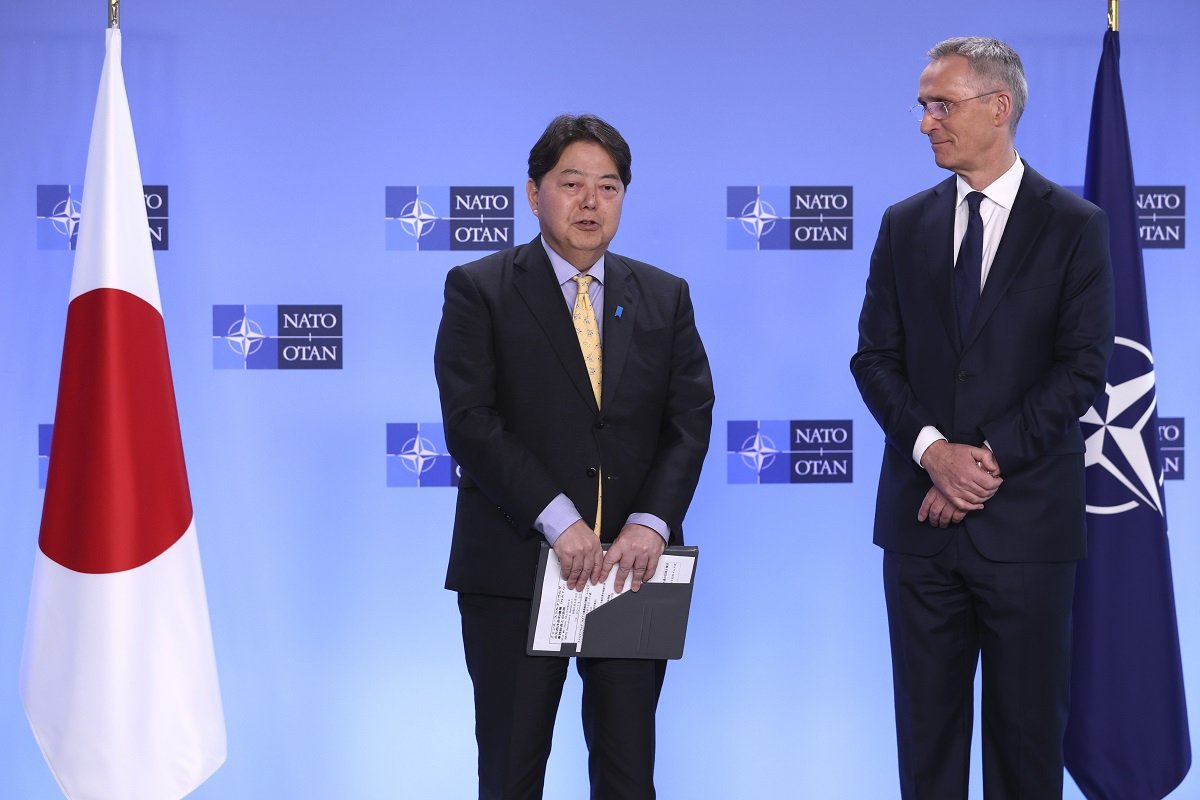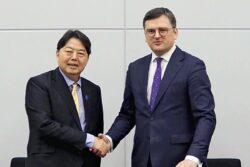
NATO Secretary General Jens Stoltenberg, right, and Foreign Minister Yoshimasa Hayashi appear at a media conference on the sidelines of a meeting of NATO foreign ministers in Brussels on Tuesday.
20:00 JST, April 6, 2023
BRUSSELS — Japan intends to deepen cooperation with the North Atlantic Treaty Organization to help uphold the international order, Foreign Minister Yoshimasa Hayashi indicated in Brussels on Wednesday. As NATO’s concerns about China’s actions mount, there are growing expectations within the alliance that NATO partner Japan will assist in ensuring stability in the Indo-Pacific region and in analyzing situations involving China.
At a meeting of NATO members and partner nations, Hayashi touched on Russia’s invasion of Ukraine and stressed the importance of like-minded countries standing together.
“We must continue implementing strict sanctions against Russia in order to end its outrageous acts of aggression as quickly as possible and to deter similar attempts from occurring again anywhere in the world,” said Hayashi, who attended a meeting with NATO foreign ministers for the second straight year.
The “similar attempt” that concerns observers the most would be an effort by China to unify with Taiwan by force. Hayashi said, “Unilateral attempts to change the status quo by force have been continued and intensified in the East and South China Seas.”
NATO also is concerned about Beijing’s actions. NATO Secretary General Jens Stoltenberg held a meeting Wednesday with Hayashi and representatives of three other invited partner nations — South Korea, Australia and New Zealand. Stoltenberg said security in Europe was inseparable from security in the Indo-Pacific, and stressed that “it is even more important” that NATO allies and partners stand together as China and Russia become increasingly aligned.
Tokyo and NATO have steadily deepened their cooperation. “No other partner is closer and more capable than Japan,” Stoltenberg said. In March, a Self-Defense Forces aircraft participated for the first time in a NATO-led disaster relief operation by airlifting supplies as part of the international response to a devastating earthquake that struck southern Turkey. Also in March, Prime Minister Fumio Kishida announced Japan would provide Ukraine with nonlethal defense equipment assistance through a NATO trust fund.
NATO, which is a military alliance, considers an armed attack on one member as an attack on all. Alliance members are obligated to respond to any such situation by assisting the attacked member. Japan will boost its presence as a NATO partner, but the reality is that being a partner “is very different from being a member nation,” a senior Foreign Ministry official said.
The Japanese government, while recognizing the limitations on what actions it can take, is preparing to broaden cooperation with NATO in fields including information sharing, cyberspace, outer space and steps to combat disinformation.
“From NATO’s perspective, it’s very difficult to understand China, which is not in Europe and has a different culture,” said Jun Nagashima, a former Air Self-Defense Force lieutenant general and an expert on European security. “NATO will need Japan’s insights.”
Nagashima also pointed out that Japan-Europe cooperation will highly likely be effective when responding to disinformation and cyber-attacks that observers fear might happen should a contingency involving Taiwan occur.
Top Articles in Politics
-

Japan PM Takaichi’s Cabinet Resigns en Masse
-

Sanae Takaichi Elected Prime Minister of Japan; Keeps All Cabinet Appointees from Previous Term
-

Japan’s Govt to Submit Road Map for Growth Strategy in March, PM Takaichi to Announce in Upcoming Policy Speech
-

LDP Wins Historic Landslide Victory
-

LDP Wins Landslide Victory, Secures Single-party Majority; Ruling Coalition with JIP Poised to Secure Over 300 seats (UPDATE 1)
JN ACCESS RANKING
-

Producer Behind Pop Group XG Arrested for Cocaine Possession
-

Japan PM Takaichi’s Cabinet Resigns en Masse
-

Man Infected with Measles Reportedly Dined at Restaurant in Tokyo Station
-

Israeli Ambassador to Japan Speaks about Japan’s Role in the Reconstruction of Gaza
-

Videos Plagiarized, Reposted with False Subtitles Claiming ‘Ryukyu Belongs to China’; Anti-China False Information Also Posted in Japan



























